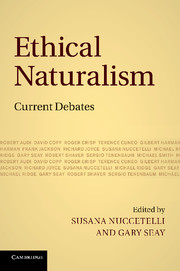Book contents
- Frontmatter
- Contents
- Contributors
- Introduction
- Chapter 1 Naturalism in moral philosophy
- Chapter 2 Normativity and reasons: five arguments from Parfit against normative naturalism
- Chapter 3 Naturalism: feel the width
- Chapter 4 On ethical naturalism and the philosophy of language
- Chapter 5 Metaethical pluralism: how both moral naturalism and moral skepticism may be permissible positions
- Chapter 6 Moral naturalism and categorical reasons
- Chapter 7 Does analytical moral naturalism rest on a mistake?
- Chapter 8 Supervenience and the nature of normativity
- Chapter 9 Can normativity be naturalized?
- Chapter 10 Ethical non-naturalism and experimental philosophy
- Chapter 11 Externalism, motivation, and moral knowledge
- Chapter 12 Naturalism, absolutism, relativism
- Bibliography
- Index
Chapter 12 - Naturalism, absolutism, relativism
Published online by Cambridge University Press: 05 January 2012
- Frontmatter
- Contents
- Contributors
- Introduction
- Chapter 1 Naturalism in moral philosophy
- Chapter 2 Normativity and reasons: five arguments from Parfit against normative naturalism
- Chapter 3 Naturalism: feel the width
- Chapter 4 On ethical naturalism and the philosophy of language
- Chapter 5 Metaethical pluralism: how both moral naturalism and moral skepticism may be permissible positions
- Chapter 6 Moral naturalism and categorical reasons
- Chapter 7 Does analytical moral naturalism rest on a mistake?
- Chapter 8 Supervenience and the nature of normativity
- Chapter 9 Can normativity be naturalized?
- Chapter 10 Ethical non-naturalism and experimental philosophy
- Chapter 11 Externalism, motivation, and moral knowledge
- Chapter 12 Naturalism, absolutism, relativism
- Bibliography
- Index
Summary
Gilbert Harman begins his essay “Is There a Single True Morality?” by telling us:
As far back as I can remember thinking about it, it has always seemed to me obvious that the dictates of morality arise from some sort of convention or understanding among people, that different people arrive at different understandings, and that there are no basic moral demands that apply to everyone. (Harman 2000a: 77)
Having said this, however, he immediately admits that this opinion is not shared by many of his philosophical colleagues, and he goes on to explore the issue that divides them. Harman’s hypothesis is that they have different attitudes towards naturalism. Naturalism, he tells us, decisively favors the view that basic moral demands apply only to some. He therefore spends the bulk of his paper trying to make out that connection. This is an extremely important conclusion, if it is correct, so my aim in what follows is to consider the arguments Harman provides to support his hypothesis. To anticipate, I will argue that the view that moral demands apply only to some gains no support from naturalism, and I attempt to identify where the real source of support for that view lies.
- Type
- Chapter
- Information
- Ethical NaturalismCurrent Debates, pp. 226 - 244Publisher: Cambridge University PressPrint publication year: 2011

